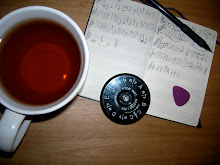Some viewers were expecting a completely new tone (literally!) to Steven Moffat's vision of Doctor Who. But the first episode of his "dark fairytale" is not exactly struggling against Russell Davies' legacy. We did not get a 'hint' of stylistic continuity—we got it full, boldly, in our eyes and ears, the very first minute of Series 5. The TARDIS insanely swooping over London to mad orchestration—yes, this is still new Who. It is Saturday night, and somehow this little antique British program dares to be bigger, more exciting, and innovative than any first-run movie, any bleak but trendy adult television serial. It’s Doctor Who. And fortunately Murray Gold is still scoring it.
Below I will focus on the two fundamental musical themes introduced in the first episode of Series 5 (and I will regretfully skip the multitude of other new cues in the episode). Murray Gold continues to use a style of thematic (character) cues as in previous series, but... the comparisons are scant, because his scoring style has again evolved. The themes, at least, are now more complex than ever!
Once upon a time, back before Series 3 was broadcast, the ad-makers on the DW production team grabbed a tune from that series’ episode Gridlock and set it over a pre-series trailer. The result was that "All the Strange Strange Creatures" became an instant anthemic action tune before it ever appeared in the show. The 'equivalent' theme, dare I say, is the new Doctor's action theme (as yet unnamed), again presented in a pre-series trailer.
This tune is enormously complex, even on its first outing. It has a main and secondary vamp (as did "Strange Strange Creatures"). Those are in the tune's core time signature of 7/8. (The musical time is divided into a 2-2-3 rhythm common in the Balkans.) There are of course several melodies played over these vamps, presented in variations of instrumentation. A few bridges between the sections. And just to mix it up, there is a 4/4 beat section in some uses of the cue, featuring its own distinct vamp!
So, rhythmically it is as complex as the full "Cybermen" theme of Series 2 (which was in 10/8 as well as 4/4), and the melodic and supporting lines are as varied as those in "All the Strange Strange Creatures" (possibly including "Futurekind" in that familial definition), and yet... Despite the full orchestra and chorus, fanfares and drum vamps, electric guitars and Hammond organs—this action theme is a bit lighter and nimbler than those just mentioned. It gallops but it does not stomp. It has an amazing deftness. Plus, despite its complexity and fluidity, be warned: this tune is just as much of an incorrigible earworm as "Strange Strange Creatures." As an amateur musician of Balkan folk tunes, I am personally gratified that so many Anglo-culture viewers will now have an easy aural reference to one of my favorite beats, stuck right into their heads along with the episode and this series.
Amy's theme is also complex, but in an entirely different way. There are two scenes in this episode that both in the story and the music evoke the 'left behind' sense of Girl in the Fireplace—but the comparison clearly shows that the scoring has grown by leaps and bounds in those 3 years. The prior work had variations of the lovely theme for Reinette. But Amy has an entire suite of a theme. There is a core cue for Amy; it is almost unmetered at its start, wandering around with a gentle vocal. It seems to feature over scenes of her relationships. But that cue is far from alone. Other cues featuring piano runs mixed in with strings or vocals seem to express Amy’s sense of childhood, its loss, or even a magical escape back to it. Some sections seem to even signpost her relationship to the TARDIS and the Doctor's exits from her life—though we’ll have to see whether that interpretation holds in future episodes. The theme, as a collection of cues, somehow work together to bring an emotive content, though the connections between the different melodies and musical expression are extremely difficult to nail down. It all just somehow... says Amy.
These multi-faceted themes are not just first dabblings into cues; they're fully-grown from the start, as if sprung from Zeus' head... Which is a good thing considering that they've taken a fair bit of time in the episode; the new action theme is heard for 6-1/2 minutes (not including the end trailer), and Amy's theme (in its various sections and forms) plays for about 9-1/2 minutes. Naturally, I'm predicting that there will be more variations and extensions of these themes. And, specifically because it's so poignant, that we won't hear quite as much of Amy's theme except where there's a need to establish new aspects of her character and background.
To roll out the two new character themes in what appears to be fully dressed form is a bold move for the first episode. It roots the characters—but musically, where do you go from here? I'm looking forward to finding that out over the rest of this series.
Saturday, April 10, 2010
Subscribe to:
Post Comments (Atom)

I'm thrilled to see that you've begun a blog. I've followed your web page nearly since the time it began. Your insight into these wonderful cues is much appreciated!! Thank you for taking the time to break down your thoughts and post them online.
ReplyDelete